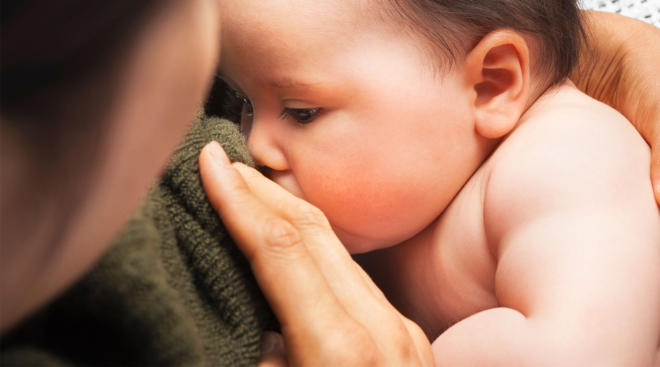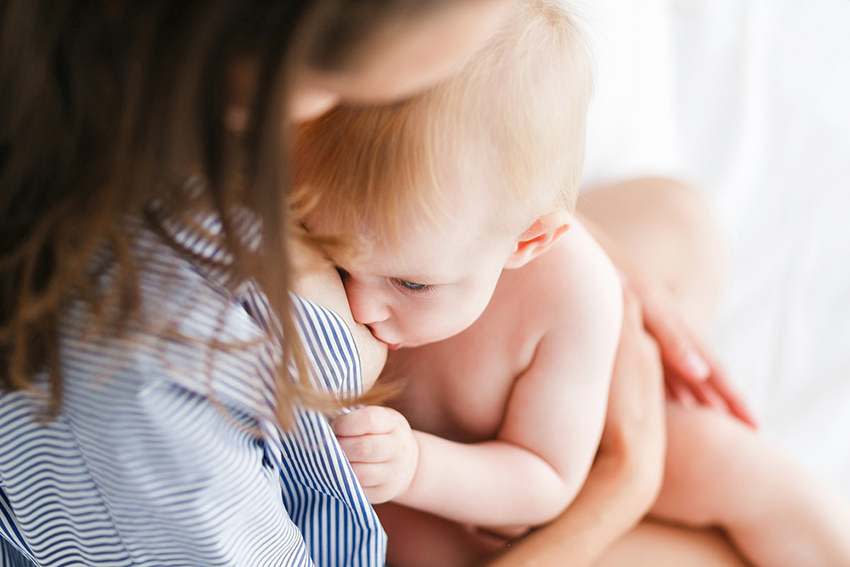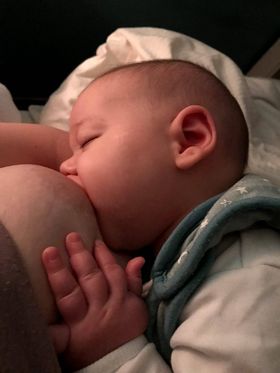can breastfed babies have peanut allergies
After two weeks his diapers were still full of mucus but I hadnt seen any visible blood in that time. You may find digestive problems that include diarrhoea cramps in the stomach nausea or even vomiting.

Bornandfed Top 8 Food Allergens Constitute 90 Of All Food Allergies Elimination Diet Diet Food Allergens
Breastfeeding lessens a babys chance of becoming sensitized to an allergen.

. Recent research suggests that consuming peanuts while you are pregnant or breastfeeding will not lead to the development of peanut allergy in your babyin fact it might help protect against it. Its still safe to breastfeed. Common allergens include dairy eggs fish shellfish peanuts tree nuts wheat and soy 1.
The NIAID guidelines recommend extremely small exposures such as peanut paste or powder but advise. Runny or stuffy nose sometimes with clear discharge. I then cut out wheat eggs peanuts and tree nuts.
Your baby might develop an allergy to peanuts because too much of the peanut butter you eat get to them via the. Five babies had confirmed breast milk allergy. Beyond breastfeeding parents can help reduce the risk of a child developing peanut allergies through early introduction of peanut foods around 4-6 months depending on a.
As for babies without eczema or food allergy the guideline says that parents should introduce peanut products freely into the diet along with other foods based on their own family preferences and cultural practices. We dont know if anything can prevent your baby from developing a peanut allergy in the first place. To put it simply peanuts are perfectly safe to eat while pregnant or breastfeeding as they pose no harm to the baby whatsoever unless the mother or the baby has an allergy or is sensitive to peanuts.
Redness or itchiness of the nose. An allergic reaction to peanut butter in a baby most commonly presents as. If you are breastfeeding your baby when an allergy to peanuts develops there may be some early signs of a reaction.
Diarrhea bloody stools vomiting colic eczema constipation and poor growth. Breastfed babies have lower rates of eczema than formula-fed babies and severe eczema seems to be related to food allergy. One clinical trial found introducing peanuts to babies led to an 81 percent reduction in the subsequent development of the allergy as reported by the NIAID.
This strategy helps to slowly introduce common allergy foods into a babys diet. Introduction of peanut In 2000 the American Academy of Pediatrics AAP published recommendations to prevent food allergy in infants at risk for allergic disease. Restricting peanut while breastfeeding is not recommended as it does not prevent peanut allergy Boyce 2011Kramer 2012.
So its not the risk to the child but the risk to the. When mothers choose to breastfeed babies can have lower risks for a number of disease conditions which may include reducing the risk of eczema a risk factor for developing food allergies. It is the sign of peanut allergy in breastfed babies is that they will be suffering from shortness of breath or wheezing.
Luckily during breastfeeding you do not have to stick to the strict pregnancy diet as long as you follow some rules of healthy eating. The exception to that might be eczema. Here are some things you can do.
Three of these babies showed tolerance to other food allergens identified in human milk. No baby returned to develop symptoms once mother started a free diet. Stomach distress such as vomiting or diarrhea.
Recent research has shown that babies given peanut protein between 4 and 11 months of age had a lower risk of peanut allergy in elementary school. The figures suggest that 14 of children now have a peanut allergy. Even a baby who has never been formula fed and has never had any food besides breast milk may show signs of food allergy including.
Peanut white egg andor cows milk were demonstrated as the hidden responsible allergens. Tightening of the throat. Some studies suggest that avoiding certain foods may reduce your babys risk for developing eczema.
What are the signs of a peanut allergy in a breastfed baby. It is the sign of peanut allergy in breastfed babies is that they will be suffering from shortness of breath or wheezing. Redness around the mouth or skin that came into contact with peanut.
You may be surprised to learn that in most cases the answer is yes. Those babies should get peanut products at around 6 months of age once like the babies in the first group they can handle solid foods. Tightening of the throat.
This means theres a good chance your baby will not be sensitive to these foods you or your babys father are sensitive to later in life if they are breastfed. Peanut protein allergens have been detected in breastmilk and some case reports and series have implicated maternal ingestion of peanuts during breastfeeding to peanut allergy in their breastfed infants4-7 Studies to determine whether maternal peanut ingestion during breastfeeding causes infant peanut allergy have come to conflicting conclusions. Her mom can continue nursing as long as she eliminates the.
Still if your family has experienced severe food allergies you might consider limiting your intake of milk and dairy products fish eggs peanuts and other nuts during pregnancy and while breastfeeding. While the risk appears low for babies AProf Loh is concerned that introducing peanut to the baby could pose an increased risk for an allergic mum. Even if you have a history of allergies in your family theres no convincing evidence to suggest that eating peanuts when pregnant or breastfeeding increases your babys risk of having a peanut allergy Kramer and Kakuma 2012 NHS 2015 NICE 2011.
A rash including red raised or itchy skin Tummy ache andor vomiting this may be more likely if the baby is also fed formula containing cows milk. Peanut Allergy May Be Triggered by Breastfeeding From the WebMD Archives April 3 2001 -- Babies susceptible to severe peanut allergy may be at risk from the potentially dangerous allergen even. If shes so severely allergic that the child had some peanut butter and kissed her or she kissed the child then her risk increases.
The study authors note that the prevalence of peanut allergies in children has more than tripled in the US between 1997 and 2010. A breastfed baby can develop a food allergy if shes exposed to an allergen such as cows milk or peanuts via breast milk. You may find digestive problems that include diarrhoea cramps in the stomach nausea or even vomiting.
One of the sign of peanut allergy is tightening of the throat among breastfed babies.

Food Allergies Are Serious In Our Family And All Of My Kids Get Tested As Infants I Breastfed My Old Food Allergies Awareness Food Allergies Baby Food Recipes

Food Allergies In Breastfed Babies Babyyumyum Co Za

Food Allergies In Breastfed Babies Babyyumyum Co Za

My Journey Of Breastfeeding My Baby With Food Allergies

Is Your Baby Reacting To Breastmilk Happy Baby Organics

Can I Eat Peanuts If I Am Breastfeeding Baby Gooroo

Allergies Food Intolerances La Leche League Gb

Ready Set Food Protect Your Baby From Food Allergies Baby Led Weaning First Foods Food Allergies Cows Milk Allergy

Food Sensitivities In Breastfed Babies

Food Allergies In Breastfed Babies Babyyumyum Co Za

Symptoms Of Allergic Reactions In Babies Solid Starts

My Baby Is Gassy Is It A Sensitivity To Dairy Or Something Else Cows Milk Allergy Baby Dairy Allergy Baby Milk Allergy Baby

5 Clues That You May Have A Dairy Allergy Baby Even If You Re Breastfeeding Dairy Allergy Baby Baby Breastfeeding Breastfeeding

Explaining Milk Protein Allergies In Babies Dairy Free Breastfeeding Milk Production Breastfeeding Milk Allergy Symptoms Baby




